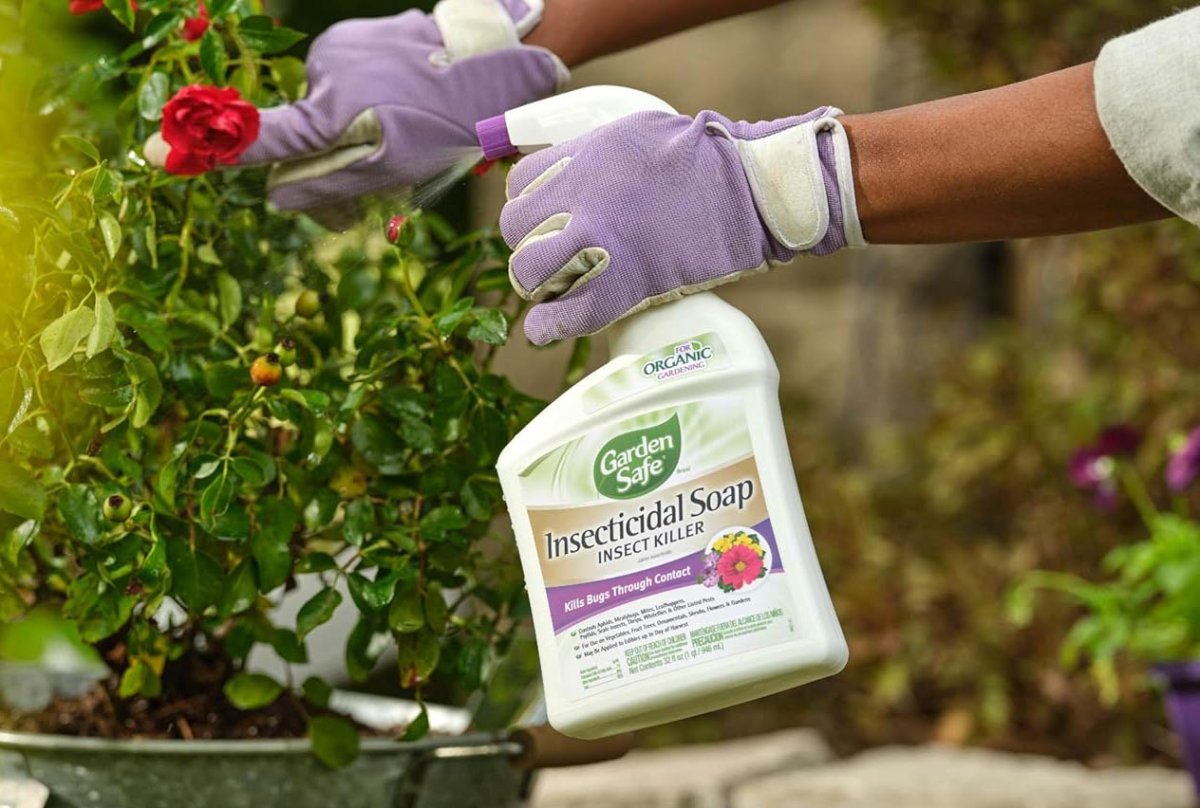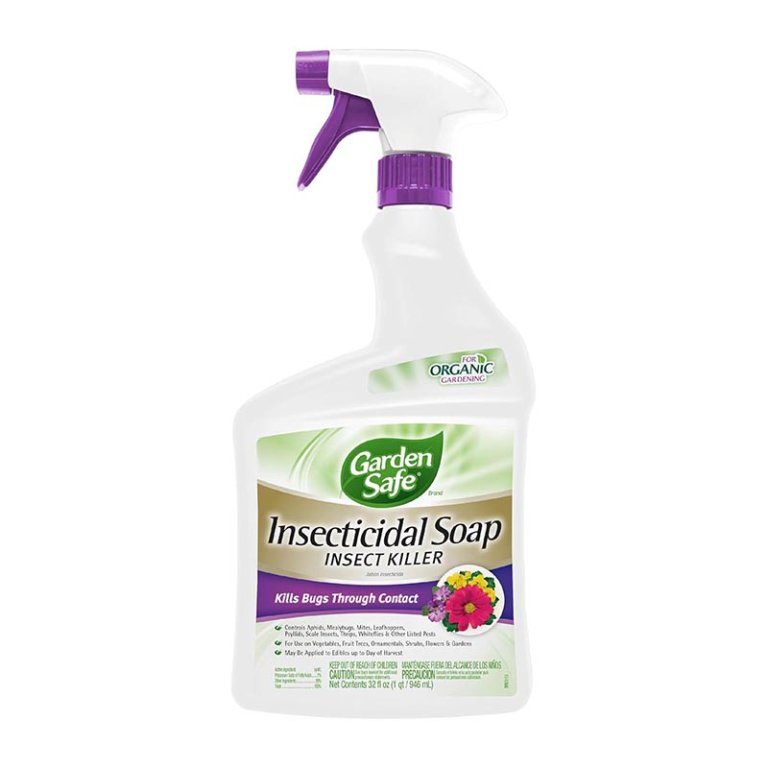
We may earn revenue from the products available on this page and participate in affiliate programs. Learn More ›
Aphids are a common home garden pest, but there are a few tried-and-true ways to get rid of these sap-sucking bugs, including methods that don’t involve any insecticides. We often suggest trying non-chemical approaches first, as some of them don’t cost anything and are very effective. But if you do need to reach for an insecticide, there are low-impact options.
We spoke with Oregon State University Extension Service horticulturist Heather Stoven, who explained: “When managing aphids, choose a low-toxic insecticide. Aphids have soft bodies and can be killed easily when good contact is made with products such as insecticidal soaps and horticultural or botanical oils. These products may need to be reapplied since they have a short residual time. However, this is what makes these insecticides safer for beneficial insects, such as ladybugs and lacewings.”
In line with our goal to choose lower-impact products, the majority of insecticides we included here are non- or low-toxic insecticidal soaps and oils. When using these types of products, Stoven advises, “Be cautious with oil products by not applying them during hot weather (above 90 degrees Fahrenheit) since they can burn leaves when applied in this situation. Also, use only commercial insecticidal soaps; these products are tested to be used safely on plants.”
Keep in mind that it’s normal to find some aphids in a garden. Often, they won’t seriously affect the health of plants, and you can leave them be. The goal of managing aphids is to prevent bothersome plant damage rather than eliminating them entirely. In the case that you do need to take care of an infestation, we’ve rounded up the best insecticides for aphids ahead, so you can take advantage of these safe options for insect control in your garden.
Best Overall
Garden Safe Insecticidal Soap Insect Killer
See ItWhat We Like
- Comes ready to use
- Safe to apply up until the day of harvest
- Also effective against several common garden bugs
What We Don’t Like
- Some reviewers note faulty sprayers
Specs
- Type: Spray
- Active ingredient: Potassium salts of fatty acids
- Quantity: 32 ounces
Garden Safe’s Insect Killer insecticide soap is effective against aphids and other pesky bugs like mites, mealy bugs, leafhoppers, whiteflies, scale insects, and more. Its active ingredient is a specially selected soap that contains fatty acid salts. Like other insecticidal soaps, this formula is safe for the environment, and it kills bugs on contact without harming plants. It’s suitable for indoor and outdoor plants, and the liquid comes in a spray bottle, so it’s ready to use right away.
As an insecticidal soap, this spray requires direct contact, which often means requiring multiple applications to manage a bug population. That’s a worthwhile trade-off for this safer formula, though, which can be used on a vegetable garden up until harvesting.
Get the Garden Safe insecticide for aphids at Amazon, Lowe’s, Ace Hardware, or Tractor Supply Co.
More Insecticides for Aphids Worth Your Money
A variety of other highly-rated and effective insecticides for getting rid of aphids are also available if you want to take a browse. The following products are popular picks, with many shoppers praising their effectiveness. They’re from reputable brands and have natural active ingredients to lessen environmental effects.
- Natria Insecticidal Soap, available at Amazon, Lowe’s, or The Home Depot.
- Safer 5118-6 Insect Killing Soap Concentrate, available at Amazon or Ace Hardware.
- Natria Neem Oil Spray, available at Amazon, Ace Hardware, or The Home Depot.
- Bonide All Seasons Horticultural & Dormant Spray Oil, available at Amazon, Lowe’s, or Ace Hardware.
- Bonide Pyrethrin Garden Insect Spray, available at Amazon.
How We Chose the Best Insecticides for Aphids
Insecticides can have a serious negative impact on the environment, so here at Bob Vila, we always prioritize low-impact options. We recommend trying non-chemical options to control aphids first, but if they don’t work, you can try one of the best aphid insecticides next, each chosen with the environment in mind.
We included insecticidal soaps and oils, which all have a lower impact on gardens and the local ecosystem than many synthetic products. In fact, some of these products can be used on edible plants up until the day of harvest. We also included a pyrethrin product as a last resort. We conducted extensive research in choosing each product, ultimately opting for those with safe ingredient lists, but that are still highly rated for managing garden pests. Easy application was also a priority, and several items on this list come ready-to-use to simplify spraying for aphids.
FAQs
If you’re wondering how to get rid of aphids, you might have more questions about these common garden bugs. Ahead are some frequently asked questions about the insect and its habits so that you’re better informed before using an insecticide.
Several factors can contribute, including plant health, growing conditions, the climate, and the aphids’ life cycle. A healthy, established plant will have a better chance of aphid prevention than a stressed plant or new growth.
Aphids thrive in warmer temperatures, and the bugs’ eggs can overwinter during colder months. As such, it’s possible for aphids to be present in some form year-round, or until you deal with the infestation.
You can use aphid treatment as you notice them. Products like insecticidal soaps and oils need direct contact to kill the bugs, so there’s no use treating the plant unless you see aphids. Systemic aphid control is often not necessary. There are non-systemic options that are safer and still effective.
Sometimes, not much at all! Aphids on plants are very common, and many times, they’re tolerable. But if they’re starting to damage your plants in a way that bothers you (damage of aphids can look like yellow, contorted leaves), you can consider getting rid of them.
There are over 1,000 species of this little bug in North America alone, so there are many, many different types of aphids.

